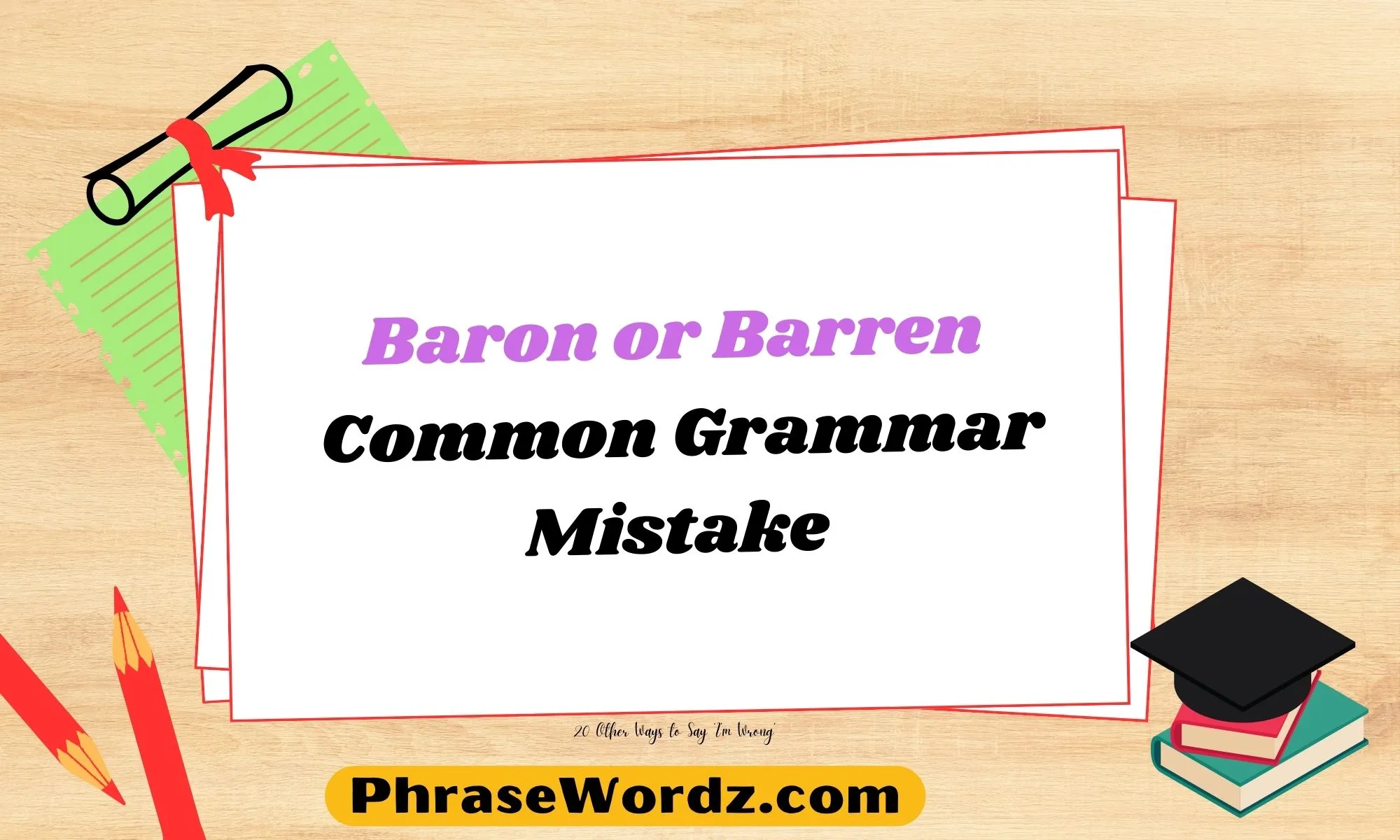Homophones like baron and barren often confuse English language learners due to their identical pronunciation but vastly different meanings and spellings. When used inappropriately, these words can alter the meaning of a sentence, sometimes with amusing or unintended consequences.
Adding to the confusion, baron may also double as a proper noun, making it necessary to understand its context. We’ll explore the meanings of “baron,” “barren,” and the possibility of confusing a proper noun Baron.
Understanding the Terms
1. Baron
A baron refers to a title of nobility, often signifying a person of high rank or influence, especially in historical or feudal contexts. It can also represent someone with power in a specific domain, like a “media baron.”
Examples:
- Contextual Usage:
- “The baron inherited vast lands and was known for his philanthropy.”
- “Rupert Murdoch is often referred to as a media baron for his dominance in the publishing industry.”
- Proper Noun:
- The name Baron is sometimes used as a first name:
- “Baron Smith attended the gala last evening.”
- The name Baron is sometimes used as a first name:
Scenario Example:
Email:
Subject: Invitation to the Historical Seminar on British Nobility
Dear Baron Alcott,
We are pleased to invite you to our annual Historical Seminar focusing on the legacy and responsibilities of the British nobility. As a prominent figure, your insights would be invaluable to the discussion.
Please let us know if you’d be interested in participating.
Warm regards,
Anna Porter
Event Coordinator
2. Barren
The word barren is an adjective that describes something unproductive, desolate, or lacking in life. It is often used for landscapes, ideas, or situations.
Examples:
- Describing Land:
- “The barren desert stretched for miles without a single sign of life.”
- “Farmers found the land too barren for cultivation after years of drought.”
- Metaphorical Use:
- “Her efforts to revive the project proved barren after months of trying.”
- “The discussion turned into a barren argument, with no productive outcome.”
Scenario Example:
Office Conversation:
Lisa: “Darcy, I’ve been brainstorming ideas for the marketing campaign, but everything feels so barren—I can’t seem to think of anything exciting.”
Darcy: “Let’s take a break and revisit this after lunch. Sometimes stepping away can help revive creativity.”
3. Baron as a Proper Noun
Confusion arises when Baron is used as a name. Its meaning depends entirely on the context, and it should always be capitalized when used as a name.
Examples:
- Name:
- “Baron is scheduled to lead the team meeting on Monday.”
- “The new employee, Baron, comes highly recommended by his previous manager.”
Scenario Example:
Workplace Email:
Subject: Congratulations on Joining the Team!
Hi Team,
Please join me in welcoming Baron Taylor to our department. He will be taking on the role of Senior Financial Analyst, bringing a wealth of experience to our projects.
Let’s ensure Baron feels supported as he transitions into his new role.
Best regards,
Elizabeth
Common Grammar Mistakes
Mixing Up Baron and Barren
- Incorrect: “The barren of the estate attended the meeting to discuss the inheritance.”
- Correct: “The baron of the estate attended the meeting to discuss the inheritance.”
Using the Wrong Context for Barren
- Incorrect: “The marketing strategy was led by a barren of the industry.”
- Correct: “The marketing strategy was led by a baron of the industry.”
Forgetting Proper Noun Capitalization
- Incorrect: “baron hosted the company dinner last night.”
- Correct: “Baron hosted the company dinner last night.”
How to Avoid These Mistakes
1. Understand the Context
Always consider the context of the sentence. If it involves nobility or influence, use baron. For desolation or unproductiveness, choose barren.
2. Check Capitalization
If it’s a person’s name, ensure Baron is capitalized.
3. Practice with Examples
Regularly practice distinguishing these words through examples to solidify your understanding.
Additional Tip:
Consider creating mnemonic devices to remember the difference:
- Baron relates to a title (think “Royal Baron”).
- Barren describes desolation (think “Empty Barrens”).
Engaging Activities for Learners
1. Fill-in-the-Blank Exercise
- The fields were too _______ to grow crops.
- As a _______ of the tech industry, she shaped the company’s future.
- _______ Johnson is leading the team this quarter.
(Answers: barren, baron, Baron)
2. Peer Review Task
Ask a partner to review a short paragraph you’ve written. They’ll highlight any misuse of baron, barren, or Baron.
Conclusion
The confusion between baron, barren, and the proper noun Baron is a common yet avoidable grammar mistake. By understanding their distinct meanings and paying close attention to context and capitalization, you can use these words confidently in writing and conversation. Remember, mastering subtle differences in homophones enhances both your precision and professionalism in English.











